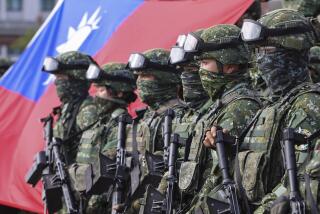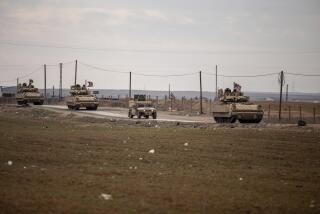Tension rises along Turkey-Syria border
- Share via
BEIRUT — Turkey said Sunday that it had scrambled fighter jets along its increasingly tense border with Syria after Syrian helicopters were detected close to the two nations’ long frontier.
Authorities said no armed confrontation and no violation of Turkish territory took place, according to Turkish news reports. But the incidents on Saturday underscored how the more than 500-mile border has gone from being a hub of free-flowing commerce to a potential tinderbox for a regional military conflict.
The border is experiencing the spillover effect of the almost 16-month civil conflict that has transformed wide swaths of long-stable Syria into battle zones.
The Syrian strife has also frayed relations between the once-close allies.
The Turkish side of the border has become a haven for weapons shipments and rebel fighters seeking to oust Syrian President Bashar Assad. Turkish Prime Minister Recep Tayyip Erdogan, once friendly with Assad, now calls the Syrian president a “bloody dictator” and has demanded that he step down, as have the United States and other Western and Arab allies of Turkey.
Syria, in turn, has accused Turkey of facilitating arms flows to “terrorists,” Syria’s label for anti-Assad rebels. Turkey denies the charge.
Yet there is no question that arms and fighters are flowing across the Turkish border into Syria. The zone is also home to more than 30,000 Syrian refugees, many if not most of them sympathizers with the rebellion.
Turkish forces have been on high alert since June 22, when Syrian antiaircraft batteries shot down a Turkish air force jet off the Syrian coast.
Syria said the F-4 Phantom jet was hit while in violation of its airspace off the coast of Latakia province. Turkey insisted the jet was struck without warning in international airspace after having momentarily wandered into Syrian skies. The two Turkish pilots are presumed dead.
After the incident, outraged Turkish authorities warned that any Syrian military movements toward the border would be regarded as a threat. Last week, Turkey also bolstered its troop presence and increased antiaircraft batteries along the border.
Some analysts viewed Turkey’s stepped-up military strength along the frontier as largely symbolic, meant in part to show resolve in the face of what many considered a humiliating shoot-down. Most observers believe Turkey wants to avoid what could be a disastrous conflict with Syria, which, like Turkey, has a large army, a modern air force and an ample supply of guided missiles. Ankara has supported the efforts of Washington and other allies to find a diplomatic resolution to the Syrian crisis.
Syria, likewise, is widely believed to want to avert a conflict with its neighbor at a time when all its forces are focused on fighting the raging insurgency inside the country.
But the latest incident indicates that it would not take much for the situation to deteriorate. Before the Turkish warplane was shot down, Turkey said half a dozen incursions by Syrian helicopters into Turkish airspace had been met with only warnings.
On Sunday, however, the Turkish military confirmed that F-16 fighter jets were scrambled on several occasions Saturday even though there was no Syrian violation of Turkish skies. According to Turkish news media reports, the military command said Syrian helicopters flew within four miles of the border.
Syrian has been deploying helicopter gunships in its ongoing efforts to push back opposition fighters from rebel-held territory, including districts in several restive suburbs of Damascus, the capital. Although insurgents have been able to seize towns and neighborhoods, opposition forces armed mostly with rifles have found it hard to maintain control once the government counterattacks with artillery, tanks and helicopter gunships.
Rebel forces were reported to have withdrawn over the weekend from the Damascus suburb of Duma, long an insurgent stronghold, after days of Syrian military bombardment. Opposition activists reported government massacres of civilians in Duma and unrestricted shelling of civilian neighborhoods. The government said it battled terrorists who had set up torture cells and forced out residents.
In another Damascus suburb, Zamalka, unverified video posted online Sunday by the opposition showed what were described as funerals for several dozen people killed in an explosion Saturday. The opposition blamed the government for firing a mortar round or setting off a car bomb as a funeral cortege passed by. There was no response from the government.
More to Read
Sign up for Essential California
The most important California stories and recommendations in your inbox every morning.
You may occasionally receive promotional content from the Los Angeles Times.









